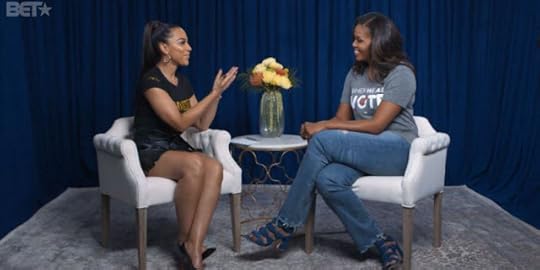“When We All Vote”: A First Lady’s Democratic Lens
 “When We All Vote”: A First Lady’s Democratic Lens by Wilfredo Gomez | @BazookaGomez84 | NewBlackMan (in Exile)
“When We All Vote”: A First Lady’s Democratic Lens by Wilfredo Gomez | @BazookaGomez84 | NewBlackMan (in Exile)Recently BET hosted Angela Rye’s Midterm Election Special: Our Vote, Our Power a critical dialogue about the elections some have labeled “the most important in a generation.” The special featured figures such as Valerie Jarrett and Corey Booker touching on topics such as criminal justice reform, restoring the vote, voter purges in Georgia, black women on the 2018 ballot, and voter protection laws. Moreover, the viewing audience received information on states holding early voting and the number of black folk who hold elected positions. One of the most poignant moments featured Rye’s exclusive interview with “our forever First Lady” Michelle Obama.
Rye began the conversation asking Obama to discuss her earliest voting memory. She proceeded to chronicle the ways her father embodied the essence of democratic participation and civic engagement. A precinct captain in Chicago, Fraser Robinson III, worked collaboratively with the city’s alderman to ensure that surrounding neighborhoods had whatever resources they needed. Robinson was a firm believer in active civic engagement, developing an intimate relationship with neighbors, wherein they were not solely votes to be courted and casted, but names, experiences, relationships, and perspectives that were indicative of the inherent potential wealth of democracy when all felt included and had access to the vote.
The patriarch of the Robinson family represented a key cog in that democratic spoke wheel, an intersectional identity that saw blackness and disability as being interdependent co-texts, much like the lyrics and instrumental of a multilayered track, his identities were in sync with one another. Crutches (a constant and ever-present reference point for Obama as reflects on the memories and legacy of her father) were a vehicle and extension of the body, enabling Robinson in his efforts to navigate the urban terrain, exercising the vote and mobilizing a community in spite of rain, snow, or pain. Democracy moves with and through this disabled body, to paraphrase Angela Rye during the course of that discussion.
While Obama suggests that multiple sclerosis is the disease that ultimately took her father’s life, she appears conscious and deliberate about deploying the language of disability to characterize the ways in which disability functions as a metaphorical albatross wherein society becomes inhibited from embodying its intended altruistic objectives. The image of the black disabled body is a norm for Obama, as she recalls both impairment and the societal obstacles that inform a larger apparatus of disability. In remembering her father, we as viewers are sensitive, through language and narrative, to the qualitative experiences that illuminate data from the CDC noting that one in four Americans lives with a disability. But more importantly, Obama’s story affords us a critical lens from which to evaluate and assess notions of social justice leadership and disability inclusion.
I raise this point thinking about the credible and legible body. Legibility, a reference point for a pedagogical project centered on the literacy or literacies of the body, addresses questions/discourses of humanity, while credibility recognizes the embodied/performed identities that exist at the intersections. The latter point raises the question of whether or not people will be permitted to claim a safe space in their own skin, and be their true selves. For Robinson, this true self, was a democratic self, a voting self that saw blackness functioning at the intersections of disability. While not tangible with regards to finances, influence, or control, Obama suggests that voting as a black disabled man wielded a power that exceeded the boundaries of democratic inclusion to consider questions of access.
Collectively, thoughtful reflection on these experiences inform Obama’s newest initiative When We All Vote, a manifestation of her own intersectionality: a black woman whose formative democratic experiences come in intimate contact with disability. In further politicizing disability as a category for community building, disability disrupts the narratives of both the raw numbers of citizens who in fact do not exercise that right (to vote), and the statistical data that informs how politicians go about being self-selective in their canvassing of community pre and post election cycle, a conscious course of actions and political ideologies based on populations who are either non-voters, or are themselves grossly underrepresented as such.
Disabling the electoral process, as my analytical reading suggests, is to disrupt the societal obstacles that have been barriers to democratic participation, giving way to voter purges as evidenced in the Georgia Gubernatorial race. If we think and vote intersectionally, as Obama’s We All Vote campaign suggests, we as a society fill in Angela’s Rye prompt to finish this sentence, “When we all vote…”
***
Wilfredo Gomez is an independent scholar and researcher. He can be reached at gomez.wilfredo@gmail.com or via twitter: @BazookaGomez84.
Published on November 06, 2018 13:48
No comments have been added yet.
Mark Anthony Neal's Blog
- Mark Anthony Neal's profile
- 30 followers
Mark Anthony Neal isn't a Goodreads Author
(yet),
but they
do have a blog,
so here are some recent posts imported from
their feed.



